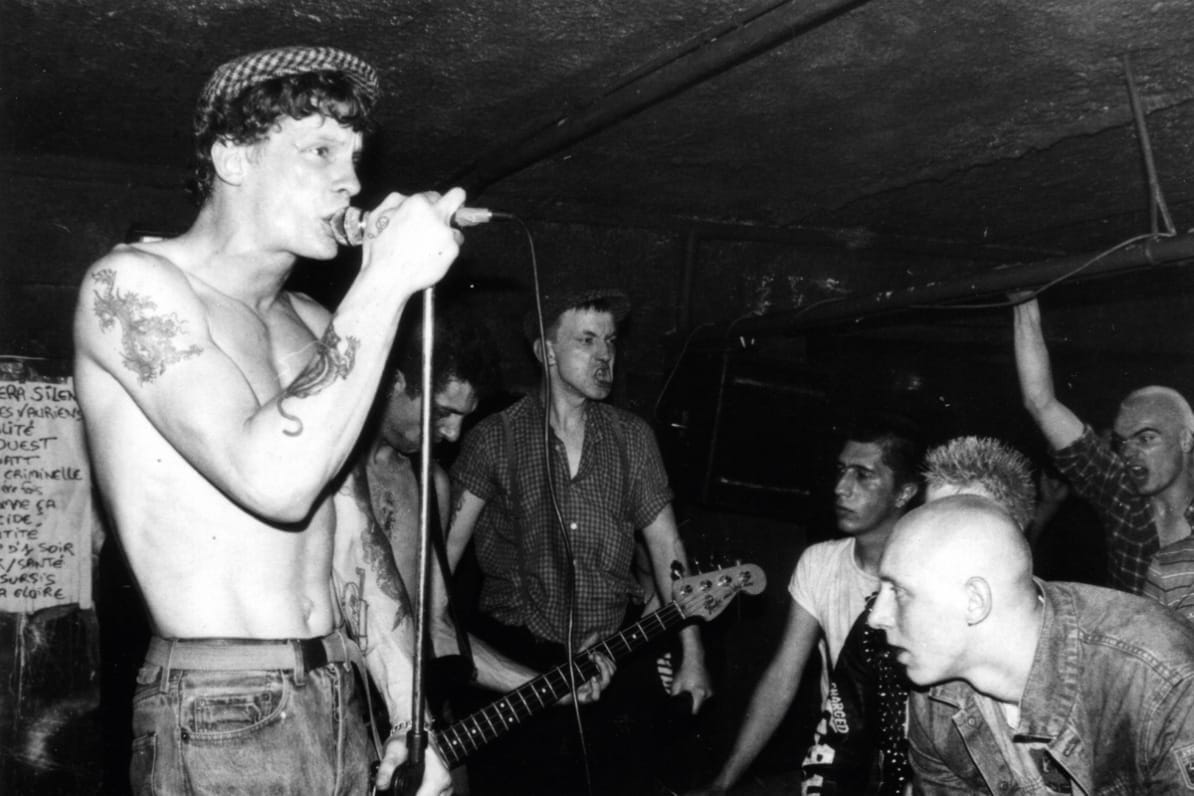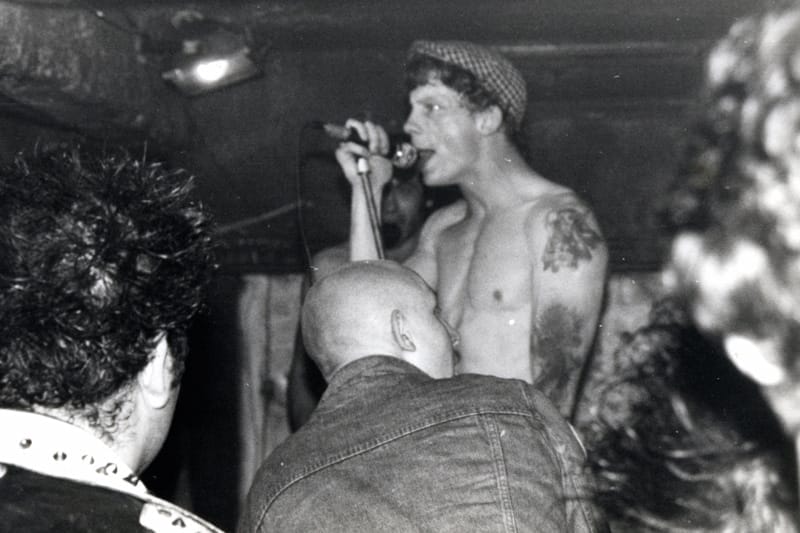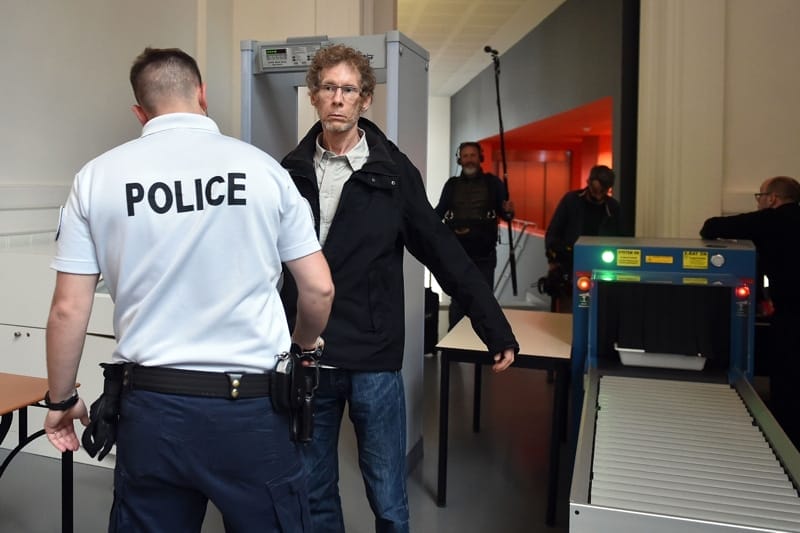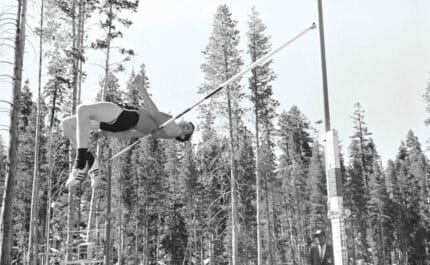Punk’s not dead: the surprise return of France’s rock and roll bankrobber
Gilles Bertin, described by some as France’s answer to Sid Vicious, spent almost 30 years missing presumed dead after taking part in one of the biggest robberies in French history. On 6th June 2018 he finally faced justice after handing himself in. In DG #31 he told us about his years in the wilderness and his quest for redemption

Gilles Bertin performing with Camera Silens in Dijon on 31st May 1985. Photo: Patrick Bouillot
6th June 2018 (Taken from: #31)
On the evening of Tuesday 26th April 1988, a Renault 4 painted to look like a police car drove along the route d’Espagne, which leads south out of the French city of Toulouse. It parked up and two men disguised as police officers stepped out and knocked on the door of an employee of global security giant Brink’s. When he answered they handcuffed him and his wife and drove them to a shed in Plaisance-du-Touch, a quiet residential suburb to the west of the city.
Meanwhile two of their accomplices, their faces concealed by hoods, were arriving in the well-to-do district of Côte-Pavée a few miles away, where they picked up a second Brink’s employee and his wife, bundled them into a car and brought them to the shed. With their hostages assembled, the crooks spent the night interrogating the two Brink’s men about the security protocols at their workplace on rue Ferdinand Lassalle.
First thing the next morning one of the hostages, who had been forced to wear an explosive belt, entered the Brink’s depot, turned off the alarms and allowed the robbers in. As employees began to arrive for work they were threatened with guns and locked in a room while the criminals ransacked the vaults. At 8am the gang left, walking out under the protection of their fellow thieves who stood guard in their fake police uniforms, their radio scanner tuned to the local police frequency.
Eight years after the French Republic declared him dead, Gilles Bertin is on remarkably chatty form”
On the face of it the heist was a huge success. The crooks walked out with 12 million francs in cash (the equivalent of around £1.8 million today) without a shot fired. In their delight they became cocky: one reported the robbery to a local newspaper, keen for the public to know of the group’s success.
But the majority of the Brink’s depot’s 14 robbers were not experienced criminals. The group was a mishmash of musicians, squatters and anarchists, some of whom were drug addicts who had contracted HIV through sharing heroin needles. Driven by fear, nihilism and the desire to make a big splash before succumbing to Aids – which in 1988 was still considered a death sentence – they had decided to risk everything on one lucrative crime. Sadly for them, they were much better at both stealing and spending money (less than ten percent of the loot was ever recovered) than lying low. Within a couple of years the entire gang had been caught.

Gilles Bertin on stage with Camera Silens in 1985. Photo: Patrick Bouillot
All, that is, except for one: Gilles Bertin. Bertin, who was 27 at the time, had until recently been the bassist and lead singer of Camera Silens, a punk band from Bordeaux which has gained regular comparisons to the Sex Pistols. Bertin signed up for the heist in a spirit of punk defiance and rebellion. When it was over he disappeared with his share of the haul and despite the best efforts of the police was never found. He was sentenced in absentia to ten years in prison by a French court in 2004 and in 2010 his siblings had him registered as deceased in order settle a family inheritance.
Eight years after the French Republic officially declared him dead, Gilles Bertin is on remarkably chatty form. Before telling me about his return from the dead, though, he wants to put the record straight about Camera Silens.
“We were very far from being the Sex Pistols,” he says. “We did not have their talent or their creativity; all we were doing was imitating English musicians. We started out as nothing and we ended up as no big deal. We sold a few records but apart from that we basically went unnoticed at the time. The band gained a bit more status over time, but still.”
I cut all ties with my old life. It was so difficult. I did not have contact with my family or with my child”
Bertin left the band in 1986 and began his metamorphosis from punk bassist to armed robber. “It was a long drift that started with drugs,” he says. “I started taking heroin and I got into some legal difficulties and went to prison. I met people inside and although I continued with my music after I was released I also kept up my prison contacts and fell into crime.”
Bertin doesn’t like talking about the robbery itself, and claims not to remember it in detail. He expresses regret for the fear experienced by the hostages that day. When he fled the scene with bags filled with banknotes he headed first to Spain then, scared the police were on his trail, to Portugal. There he bought a record store just outside Lisbon and began a life of anonymity that would last for almost three decades.
“I was extremely cautious – and extremely lucky,” says Bertin of his years missing presumed dead. “I cut all ties with my old life. It was so difficult. I did not have contact with my family or with my child [son Loris, aged two at the time]: no father, no mother, no friends. I was lucky to meet my partner [Cécilia Miguel], which allowed me to start to rebuild something. The rule is that you never speak about yourself again, you make yourself forgotten, you move on to something else.”
As a fugitive, Bertin lived off the grid. “I had no contact with the state, I never even opened a bank account, I did not exist.” Then he fell sick. He took a test and it confirmed his fears: he was HIV positive. He needed treatment, but it was impossible without a social security card. Cécilia organised documents to help him get it. Thanks to the triple therapy for HIV which arrived in the mid-’90s, his symptoms were brought under control – although he did later lose the use of his left eye in a subsequent flare-up of the condition.
Once a customer recognised me… he didn’t speak to anyone about it, but it was a shock”
Bertin never escaped the fear of being discovered. “You become paranoid,” he says, “particularly at the beginning, I was scared all the time. And I passed my fear and paranoia on to Cécilia because we were living together. It was extremely tough.” He had a couple of close shaves. “Once a customer recognised me,” he recalls. “It didn’t end up creating any problems because he didn’t speak to anyone about it, but it was a shock.” In 2006 he and Cécilia moved to Barcelona, where he worked behind the bar in her parents’ café, and four years later they had a son together.
In 2016, after 28 years on the run and now aged 55, Bertin took the decision to return to France and face the music. “I’d been thinking about handing myself in for a long while,” he says. “But it was the birth of my second son that finally made up my mind. I couldn’t continue as I was, and nor could his mother.”
On 17th November 2016, Bertin walked across the Franco-Spanish border at Puigcerdà in Catalonia and, heart in mouth, took the train to Toulouse. Before handing himself in at the police station – at which point he would learn that he had been declared dead six years earlier – Bertin made a call to Christian Etelin, a lawyer who had defended many of his co-conspirators from the Brink’s robbery. “He had a reputation for having defended anarchists, and of being receptive to this type of story,” says Bertin. “I felt he could help me.”
Christian Etelin was understandably surprised to receive a call from a long-dead punk bassist. “He could have continued to live in secret under a false identity and risk nothing,” says Etelin, 74. “He could have waited for the statute of limitations to run out in 2024. But he decided to be judged. He ran the risk of being imprisoned, of losing his freedom just so he could have a clean conscience. Why? Because he had a child who was five years old at the time and he could not raise this boy if he lied to him about his past. He felt that he owed his kid the truth.”

Bertin’s lawyer Christian Etelin. Photo: Blondeau Manuel/ABACA/PA Images
Etelin had been sympathetic to the Brink’s robbers he had previously defended. “Many of the people involved in this crime were young artists and musicians, some of whom had HIV… They wanted money so that they could live what remained of their lives as intensely as possible,” he says. He found Bertin to be “a very endearing man, very clever, open minded, tolerant and respectful of others”, and agreed to represent him.
His first challenge in defending Bertin was to persuade the authorities to reopen the case. “I had visited the judges to tell them that Monsieur Bertin was going to introduce himself,” he says. “They were not very happy that they had to organise a trial for him and reopen a file that everyone had forgotten about. It was a real pain for them!” Etelin secured his client’s release on bail in the run-up to his trial in June 2018, although Bertin was not allowed to leave France.
One of Bertin’s first actions was to request a fresh copy of his birth certificate from the town hall. He also tried to reconnect with the two-year-old son he had left behind in 1988, who was now 30. “I didn’t know what to expect,” says the former punk. “But he came to meet me immediately and we got to know one another. We spent a Christmas together with family in Bordeaux. Of course he has his own life, but we are in touch, we call each other fairly often.”

Bertin arriving at the criminal court of Toulouse on 6th June 2018, 30 years after taking part in a £1.8m bank heist. Photo: Remy Gabalda / AFP / Getty Images
At trial, Etelin argued that Bertin had fundamentally changed since his youth. “I told the court that he should not go to prison,” he says. “He lived for 30 years as an honest man, despite experiencing the greatest difficulties. He did not pose the slightest problem.” The prosecutor general saw things differently, and sought a five-year custodial sentence for Bertin on the basis that the facts of the robbery had not changed with time. Etelin launched a blistering, literature-based defence. “I said, ‘I do not know if you know Les Misérables by Victor Hugo,’” he recalls. “‘There is a character called Javert who pursues Jean Valjean, wanting to put him in prison. You are like Javert, you want to put in prison someone who has all the qualities of an honest man!’”
Etelin also decided to put Bertin’s partner, Cécilia Miguel, in the witness stand. “Her testimony was decisive,” he says. “She spoke about their background, their story and how Gilles had decided to come to court to explain himself for the sake of their child. She said that he deserved a punishment, but asked that it would not be prison because he had done a lot to try to build a future for their child. She spoke in a sensitive and very intelligent way which I think was very important in the minds of the jurors.”
I’ve defended a fair few extraordinary cases, but this was the most moving of the lot”
On 6th June 2018, the court gave Bertin a five-year suspended sentence, meaning that he would walk free, despite the serious nature of his crimes. The result was greeted by applause in the courtroom, and surprise by Bertin. “It was a serious case; I really thought I was going to prison,” he says. “The sentence I got was very lenient.”
“I’ve defended a lot of cases,” says Etelin. “I’ve known a fair few extraordinary ones, but this was the most moving of the lot… It showed that there are other pathways to redemption than prison.”
In the weeks after the trial, Bertin was obliged to remain in Toulouse while the French state reissued his documents and unpicked his official status as a long-dead corpse. During his enforced sojourn in France he began work on a book telling the story of his life and in August he returned to his family in Spain, where his plans for the future are simple.
“My son is seven years old and I need to take care of his education. Apart from that I must learn to live in freedom, finish my book and then get back to work,” he says. “I have no other dreams. Just a normal life. Only that matters.”
Watch Gilles Bertin performing on video with his band, Camera Silens, during their ’80s punk heyday.
Slow Journalism in your inbox, plus infographics, offers and more: sign up for the free DG newsletter. Sign me up
Thanks for signing up.








